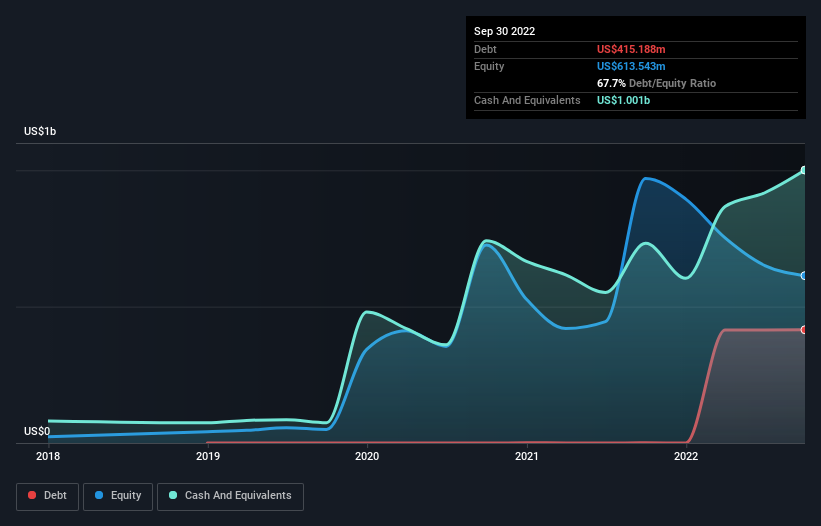- United States
- /
- Aerospace & Defense
- /
- NYSE:SPCE
Health Check: How Prudently Does Virgin Galactic Holdings (NYSE:SPCE) Use Debt?

Some say volatility, rather than debt, is the best way to think about risk as an investor, but Warren Buffett famously said that 'Volatility is far from synonymous with risk.' It's only natural to consider a company's balance sheet when you examine how risky it is, since debt is often involved when a business collapses. Importantly, Virgin Galactic Holdings, Inc. (NYSE:SPCE) does carry debt. But the more important question is: how much risk is that debt creating?
When Is Debt A Problem?
Debt is a tool to help businesses grow, but if a business is incapable of paying off its lenders, then it exists at their mercy. If things get really bad, the lenders can take control of the business. While that is not too common, we often do see indebted companies permanently diluting shareholders because lenders force them to raise capital at a distressed price. Having said that, the most common situation is where a company manages its debt reasonably well - and to its own advantage. When we think about a company's use of debt, we first look at cash and debt together.
Check out our latest analysis for Virgin Galactic Holdings
How Much Debt Does Virgin Galactic Holdings Carry?
The image below, which you can click on for greater detail, shows that at September 2022 Virgin Galactic Holdings had debt of US$415.2m, up from US$548.0k in one year. But it also has US$1.00b in cash to offset that, meaning it has US$585.6m net cash.

How Healthy Is Virgin Galactic Holdings' Balance Sheet?
Zooming in on the latest balance sheet data, we can see that Virgin Galactic Holdings had liabilities of US$170.6m due within 12 months and liabilities of US$475.1m due beyond that. On the other hand, it had cash of US$1.00b and US$3.20m worth of receivables due within a year. So it can boast US$358.3m more liquid assets than total liabilities.
This excess liquidity is a great indication that Virgin Galactic Holdings' balance sheet is almost as strong as Fort Knox. Having regard to this fact, we think its balance sheet is as strong as an ox. Simply put, the fact that Virgin Galactic Holdings has more cash than debt is arguably a good indication that it can manage its debt safely. The balance sheet is clearly the area to focus on when you are analysing debt. But it is future earnings, more than anything, that will determine Virgin Galactic Holdings's ability to maintain a healthy balance sheet going forward. So if you want to see what the professionals think, you might find this free report on analyst profit forecasts to be interesting.
Over 12 months, Virgin Galactic Holdings made a loss at the EBIT level, and saw its revenue drop to US$1.6m, which is a fall of 50%. That makes us nervous, to say the least.
So How Risky Is Virgin Galactic Holdings?
By their very nature companies that are losing money are more risky than those with a long history of profitability. And in the last year Virgin Galactic Holdings had an earnings before interest and tax (EBIT) loss, truth be told. Indeed, in that time it burnt through US$329m of cash and made a loss of US$430m. However, it has net cash of US$585.6m, so it has a bit of time before it will need more capital. Even though its balance sheet seems sufficiently liquid, debt always makes us a little nervous if a company doesn't produce free cash flow regularly. The balance sheet is clearly the area to focus on when you are analysing debt. However, not all investment risk resides within the balance sheet - far from it. These risks can be hard to spot. Every company has them, and we've spotted 3 warning signs for Virgin Galactic Holdings you should know about.
If you're interested in investing in businesses that can grow profits without the burden of debt, then check out this free list of growing businesses that have net cash on the balance sheet.
If you're looking to trade Virgin Galactic Holdings, open an account with the lowest-cost platform trusted by professionals, Interactive Brokers.
With clients in over 200 countries and territories, and access to 160 markets, IBKR lets you trade stocks, options, futures, forex, bonds and funds from a single integrated account.
Enjoy no hidden fees, no account minimums, and FX conversion rates as low as 0.03%, far better than what most brokers offer.
Sponsored ContentNew: Manage All Your Stock Portfolios in One Place
We've created the ultimate portfolio companion for stock investors, and it's free.
• Connect an unlimited number of Portfolios and see your total in one currency
• Be alerted to new Warning Signs or Risks via email or mobile
• Track the Fair Value of your stocks
Have feedback on this article? Concerned about the content? Get in touch with us directly. Alternatively, email editorial-team (at) simplywallst.com.
This article by Simply Wall St is general in nature. We provide commentary based on historical data and analyst forecasts only using an unbiased methodology and our articles are not intended to be financial advice. It does not constitute a recommendation to buy or sell any stock, and does not take account of your objectives, or your financial situation. We aim to bring you long-term focused analysis driven by fundamental data. Note that our analysis may not factor in the latest price-sensitive company announcements or qualitative material. Simply Wall St has no position in any stocks mentioned.
About NYSE:SPCE
Virgin Galactic Holdings
An aerospace and space travel company, focuses on the development, manufacture, and operation of spaceships and related technologies.
Excellent balance sheet and fair value.
Market Insights
Community Narratives



